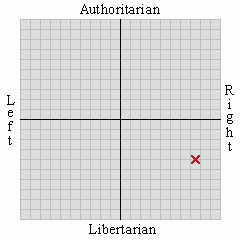And so, expanding the size of the welfare state and making it central to people’s lives, despite Thatcher’s best attempts to destroy it, was one of New Labour’s greatest achievements. And by that I mean expenditure on the NHS, on public transport, on public works, on the arts and of course on unemployment benefits.
The welfare state is key to the success of economic redistribution. And in order to maintain popularity for the welfare state it has to fulfil two criteria: it has to be universal; and it has to improve people’s lives to the point they feel they have a stake in it.
The Tories need to shrink the state for ideological reasons because the less people have contact with it, the less they’ll support it.
Ignoring the anti-Thatcher nonsense, I think this hits the nail on the head about the modern difference of Labour vs. Conservative - both support some form of welfare state, but the conservative welfare state is a safety net (as originally intended by Beveridge) while Labour's is more of a hammock, trying to make everyone feel an allegiance to it, even if it is literally taking money out of one pocket, and putting most of it into the other pocket (minus, of course, the stuff dropped on the floor as government waste).
And there was an essay in the Spectator just after the Budget, saying that Osborne wanted to move people off the welfare state to make them more self-reliant, and therefore more likely to vote Conservative.
And this is probably the key difference. It's all quite political, which isn't great, but the conservative way is to move people off the state payroll (be it direct employment or in the form of tax credits, etc) to make them more self-reliant, make them more likely to want things like corporation tax cuts and lower regulation, etc - i.e. vote Conservative. Labour's way is to move people on to that state payroll, encourage state dependency - and in that create 'client states' (see Glasgow) of people who will not vote to remove this, because it seems comfortable, it seems nice and plush, even though they are actually paying (and, since it discourages work, probably paying even more than without tax credits etc) to subsidise themselves. In short, they want people to vote Labour.
And that is a key ideological divide between the Conservatives and Labour. Modern conservatism, especially IDS, seem to see a role of government in helping people to stand on their own two feet, and not be dependent on government - and though my more libertarian strands question whether this approach is best, it is certainly a noble aim - and more noble than the idea of making people dependent on government - it's hardly helping them, and it's hardly providing any freedom.
And that's probably part of the reason that I'm a conservative - getting people off the state payroll, and to coin a phrase that a fellow canvasser said back in April, encouraging social responsibility not state dependency. It's not rabid individualism, it in fact lets people decide if they want to be self-reliant or if they want to help each other out (the social responsibility part of that phrase I just mentioned) - and I think families and communities, families especially, are incredibly important in this. I just don't think that state dependency is at all responsible, at all fair or at all helpful. The state is faceless, impersonal and doesn't generally have a clue.
A return to the Friendly Societies? No, I'm getting too optimistic.





No comments:
Post a Comment
Comment on posts here, and all posts whether critical or in agreement are fine as long as they are not abusive. Comments are moderated due to Chinese spambots.